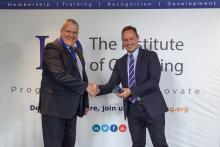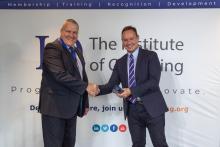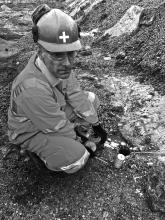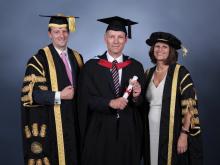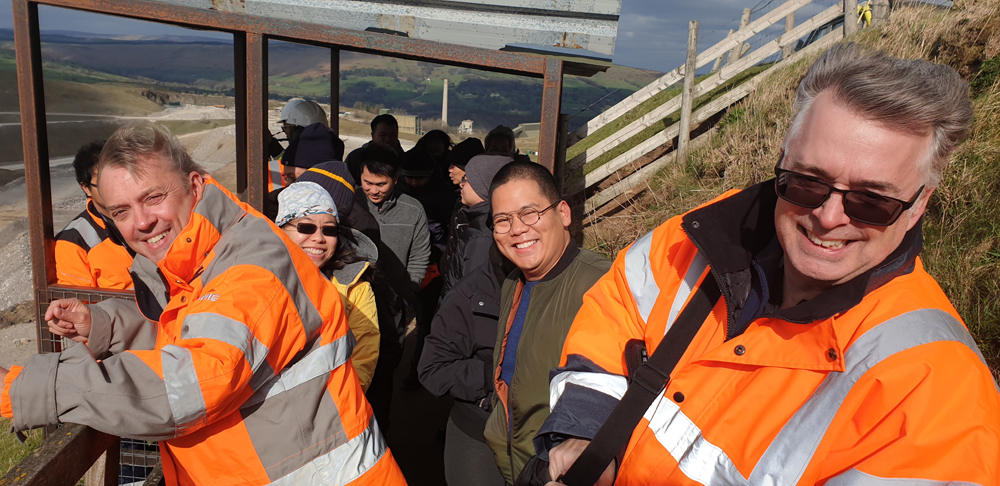
You would struggle to find another individual who fitted their job spec better than Julian Smallshaw fits his. Listening to him outline with such great enthusiasm his many roles and responsibilities as the IQ’s head of Education and Standards, you feel that time has only strengthened rather than weakened what, for him, has been a fascination with quarrying and geology since boyhood.
Before starting his current role in 2019, Smallshaw was the IQ’s head of Educational Development for five years. He also spent five years working as the IQ’s E-Learning manager. As such, the 59-year-old’s years with the globally respected and influential Chilwell, Nottingham, central England-based IQ have been all about “Education, Education, Education”, to coin a phrase made famous in a speech by then Labour Party leader Tony Blair at his party’s 1996 autumn conference.

“I started working in the [quarrying] industry when I was 17. There isn’t much I haven’t done, and I wanted to give a little bit of me back to it. I’ve seen a lot of positive changes over the years, and I was keen to help the industry continue to improve,” explains Smallshaw. “Quarrying faces exciting challenges, not least the advances in technology and how to make the industry sustainable. It’s really important that the workforce has the skills needed to meet these challenges.”
As the IQ’s head of Education and Standards, Smallshaw has a close working relationship with the IQ’s higher education provider, The Centre for Mineral Products Professional Development (C4MP) at the University of Derby. The C4MP draws on what Smallshaw describes as the IQ’s “huge education resource”. The IQ uses the same resource to deliver training to working and aspiring quarrying professionals in the United Arab Emirates, Southeast Asia, and other parts of the world.
“We provide more niche training for equipment manufacturers and suppliers within the quarrying industry, and we have CPD [continuing professional development] courses for mineral planners. We are also an approved assessment centre for the MPQC [Mineral Products Qualifications Council] - the industry body for all vocational quarrying qualifications. We are the sole supplier of the Level 3 SHE [Safety, Health & Environmental] vocational qualification. The IQ is also an ILM [Institute of Leadership & Management] centre.”
Smallshaw stresses that innovative assessment methods are part of all IQ courses. Due to increased demand, the IQ is also looking at quarry recycling training opportunities. “It’s going to be extractive focused: where you have a quarry that brings in materials to recycle and, after recycling them, sells them again.
“As well as developing courses and qualifications, I assess and train when I can. IQ is also involved in coaching and mentoring, and we have an aspiration to build an industry community. Building strong relationships with industry stakeholders, such as major and SME (small- to medium-sized) quarrying companies, is vital. For example, there is a very good connection between our Level 3 SHE certificates and the small SME operators, like dimension stone firms. It’s an area that we had never really concentrated on before and we’re finding they are coming to us as much as we are going to them with regards to education and training.”
Smallshaw, a member of the IQ’s professional standards committee linking its work on membership, standards and education, says the IQ is also developing its links with UK university and college STEM (science, technology, engineering & mathematics) course providers. He hopes this will help lower the average age, currently 56 years, of British quarrying sector workers. “We need to encourage a younger generation into what I think is one of the most exciting industries to be in.”
A popular speaker at quarrying industry networking events, Smallshaw never misses a chance to further the cause of high-quality quarrying education. But which achievements to date please him the most? “The creation of a BSc (Hons) in Minerals Management at the University of Derby and helping to create the Level 4 Higher Apprenticeship at the Centre have been high points. The BSc started in 2014 and is a bolt-on to the Level 4 Higher Apprenticeships. It created a route to a degree that was not there before. We currently have 21 people on the degree course. I’m also very proud of creating the Level 3 SHE qualification.”
Smallshaw is keen for the IQ to do more overseas to raise standards through the showcasing of quarrying best practice. This, he says, can be done through its affiliates in Australia, New Zealand, Southern Africa, Malaysia, and Hong Kong. The IQ also offers IQ Connect – an app-based membership which Smallshaw sees as a critical driver of developing links with the IQ in countries without an affiliate.
“We also do a lot of work in the United Arab Emirates,” continues Smallshaw. “We started a Gulf meeting group around the time of the global economic downturn in the early 2010s. It was quite successful, but as business gathered momentum again, people’s time was quite limited. People’s working hours in the UAE can be very long. Most of the members that we now have out there are members we first had in the UK.”
Turning his attention to another key area for future IQ education work, Smallshaw says: “There is a realisation among quarrying companies that their people need technical competences to be effective, along with health and safety and environmental knowledge. I am looking to develop softer skills among the workforce; ensuring that site supervisors and managers have the leadership and people management skills to move their businesses and the industry forward. It is the reason we have approved assessment centre status with the ILM.”
Aggregates Business Europe carried an in-depth report on the C4MP at the University of Derby in the July-August 2016 issue. At that time, it had already helped hundreds of students complete prized industry-standard, globally recognised qualifications.
C4MP qualifications run across five focus areas: Mineral Extraction (Quarries); Asphalt and Pavements (Road Construction); Concrete; Cement; and Heavy Clay (Brick & Pipe Manufacturing). In partnership with the IQ, Institute of Asphalt Technology, The Concrete Society, International Clay Technology Association, and the Road Surface Treatments Association, the C4MP currently offers 18 qualifications, ranging from the BSc (Hons) in Minerals Management; Foundation Science degrees (FdSc) in Mineral Extractives Technology; Asphalt and Pavement Technology; Clay Technology; Concrete Technology; and Cement Technology; and a Higher Apprenticeship in Mineral Products Technology to university diplomas in Mineral Extractive Studies; Asphalt and Pavement Studies; Road Surface Treatments; Clay Studies; Concrete Studies; and Cement Studies; a University Certificate in Concrete Technology, and Certificates in Construction Materials, and Ready-Mixed Concrete Technology.
Subjects covered in the BSc (Hons) programme include Leadership and Operational Management; Project Management; Finance Management; Commercial Management and Marketing; Extractives Management; Lean Structures; Quality Management; and Health, Safety and Environment Management. Students undertake a work-based project to apply everything they learn to an issue in their workplace, maximising their learning impact.
“We’re just going through a new validation of courses offered at the [C4MP] University of Derby. It’s a huge project,” says Smallshaw. “We’ve been reviewing and adding content. We’ve got a new HTML format to make courses more interactive and interesting for students to read and learn. New content includes a whole module on sustainability. Quarrying companies outside the UK have also asked the IQ to run sustainability training courses for their staff.
“A great thing about the work being done at the University of Derby is that all lecturers are from the quarrying industry – they can contextualise all the theory within practical working environments. I teach one of the BSc degree courses.”
Smallshaw says the IQ’s long-standing mixture of face-to-face, blended, and online course teaching mirrors how the C4MP runs its courses. “Students work their way through assessments with feedback. Then they’ll have a dedicated number of days, usually a Friday and Saturday, when they come into the university. This tends to happen four or five times over an academic year. Of course, this isn’t currently possible due to the coronavirus, so the IQ’s and the C4MP’s learning is done online. The challenge is to make those online experiences really good.
“I think a really interesting feature of the University of Derby courses is the wide age range of the students, outside the higher apprenticeships, which are for younger people coming into quarrying and the wider building materials industry. On any other course, you can be teaching anyone aged 18 to 55. Again, it can be a challenge for those teaching, but it’s great to have such diverse experiences and backgrounds in the tutorials.”
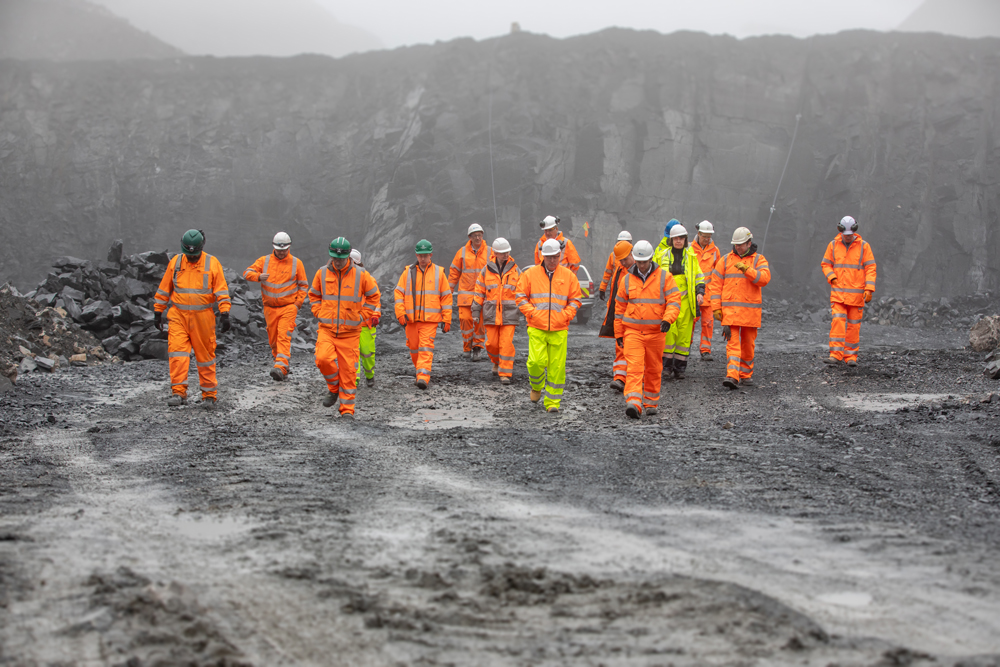
I am keen to know whether Smallshaw thinks the IQ and UK quarrying industry, in general, can do more to recruit the next generation of quarrying professionals, given today’s highly competitive and diverse jobs market.
“It’s not just an issue for the UK quarrying industry. It is an issue for the quarrying industries in a lot of developed countries. One good source of young people has been the Level 4 Higher Apprenticeship. Former IQ president and Hanson corporate director David Sharman was committed to bringing younger people in, and the first six Level 4 Higher Apprenticeship students came from Hanson. That opened the door, and since then we have had a flood of young people coming through.
“The IQ also has links with other institutions. I have a very close link with Leeds University and the Cambourne School of Mines at Exeter University. We appointed a part-time STEM coordinator, Wanda Zablocki, last year. She also works part-time as the IQ’s Benevolent Fund welfare officer. Wanda will spend two days a week helping us develop our STEM university and college links.”
There are further quarrying and mining education roles that stand out in Smallshaw’s impressive CV. He was an unpaid board director and chairman of the National Stone Centre (NSC) until 2018 and returned as a board director in September last year. The NSC is an educational institution set in 50 acres of disused limestone quarries in the Derbyshire Peak District, central England. The site reopened in early 2017 after considerable investment, and around 3,500 school children visit every year to enhance their learning. The NSC is a site of special scientific interest and home to the UK’s National Building Stone Collection.
Since November 2019, Smallshaw has also been a board director of Ecton Mine Educational Trust (EMET) based in Ecton, Ashbourne, Derbyshire. The disused Ecton Mine offers a significant educational resource, and the EMET was formed to promote education in applied geology, chemistry, mining, and mineral extraction.
After learning so much about his huge contribution to the IQ’s successful education and training work, I am curious to find out about Smallshaw’s experience at the quarry face – including his senior roles at companies including Hanson, Ennstone Johnston, Hills Aggregates and ARC Eastern in the UK.
“I remember my first proper job role running a little 150,000 tonnes a year sand and gravel pit for ARC Eastern near Peterborough. I loved it. I was able to turn it around from a loss to a profit.
“My best time at Hanson was running Clee Hill Quarry in Shropshire. Nobody could hassle you there as you were the furthest away from the regional office. It was an amazing place with absolutely fantastic people. I was there a couple of years.”
Between February 2005 and December 2006, Smallshaw was based in the UAE working as operations manager for Stevin Rock, the largest quarrying company in the Middle East, now capable of producing 75 million tonnes of aggregate a year from three sites. While managing a multinational workforce of 450, Smallshaw was tasked with producing over 12 million tonnes of limestone construction materials a year.
“It was something completely different. I started writing a book about my experiences. I was exposed to things you could only dream of,” Smallshaw says, intriguingly. “My operation was bigger than any UK quarry site. We supplied the most prestigious projects in Dubai, such as Terminal 3 at Dubai International Airport and the Dubai Metro. I was involved in heading up procurement, dealing with customers, and generally being exposed to a unique, challenging, and exciting environment. It has helped me subsequently handle complexity and better understand different workforce cultures.
“When I worked for Stevin Rock, standards were around 20 years behind the UK’s. Now, things have changed. The company is looking to be a global business and is raising standards at all levels. It has been working with the IQ as part of this.
“It’s interesting that the two people I worked very closely with in the UAE have now got the two most senior roles at Stevin Rock. They have built a business going from strength to strength.”
Was Smallshaw’s passion for training and development evident in his frontline quarrying years? “I think when you are younger, you are interested in developing your skills. As you mature, I saw the systems put in place to help quarry managers: like succession planning. I think you’ve got to have an HR [Human Resources] department that understands operations and can provide good advice to managers. I was always a great believer in ensuring that levels of competence were correct. I like to think that I pushed people that I could see had potential, and I enjoyed mentoring younger people.”
Turning his attention back to the IQ, how does Smallshaw see its role going forward? “The Institute plays an increasingly important role in the quarrying industry. We’ve never been as engaged as we are today. The IQ takes the lead in a lot of initiatives including QNJAC [Quarries National Joint Advisory Committee], the Strategic Safety Forum, and the Education and Skills Board. We also have industry buy-in from the CEOs and other senior people within major building material companies. They know and understand the IQ. We also have senior industry leaders on our board. We also have close working relationships with the HSE [Health & Safety Executive], the MPA [Mineral Products Association], BAA (British Aggregates Association), the Institute for Asphalt Technology, The Concrete Centre, and a lot of previously mentioned education institutions.
“The IQ has always been at the forefront of CPD. That side of our work will grow as we develop our digital offering in that area, such as the IQ Connect app. We’re in a really good place.”
Speaking about the current health of the UK quarrying sector, Smallshaw says: “The industry is tough and resilient. It can recover from trauma, like the coronavirus pandemic. There are many big infrastructure projects either started or due to start – including HS2, Hinkley Point nuclear power station, Heathrow airport expansion, the Lower Thames Crossing, and the [2022] Commonwealth Games [in Birmingham]. Projects like these and other smaller infrastructure projects are more important than ever before as the government looks to kickstart the economy coming out of a downturn. Infrastructure investment also encourages building material companies to invest in new mineral reserves, processing equipment, and developing their people. All this will drive the quarrying business forward over the next decade.”
Smallshaw says that the IQ is developing mineral planning expertise in UK county councils to help address long-standing concerns expressed by the MPA and others about a shortage of knowledgeable officials engaging with the mineral products industry. “We run a mineral planning course every year for prospective mineral planners. It sends a message on the importance of mineral resources and the need to have educated officials understand future requirements. Various trade bodies have been doing some great lobbying work in this area.”
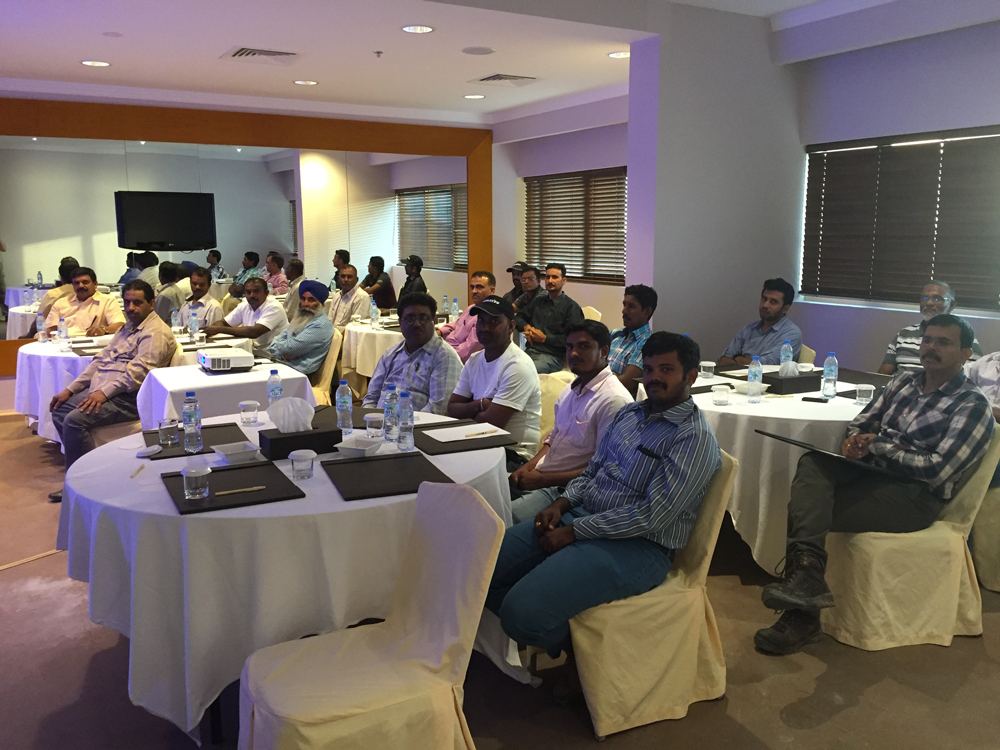
Looking ahead, Smallshaw has some interesting thoughts on how the UK quarrying industry will look and operate by the early 2030s. “I think there will be fewer people working in it, but it will be a safer environment. The automation that we already see in the mining industry will be far more popular in quarrying. Digitalisation will continue to change the way we work. And the green agenda will play an increasingly important role, such as through the need to decarbonise the workplace. Some of these changes will be driven by government legislation.”
After more than an hour’s enjoyable and insightful conversation, I could not let Smallshaw go without mentioning his vast passion for Cornish mining mineralogy.
“That originated from holidays in Cornwall. I used to go down with my parents in my early teens. I was interested in industrial archaeology, and the heritage behind the Cornish mines. In the 1800s, it was the biggest mining area in the world – firstly producing copper, and then tin. Consequently, as mines started up, collectors were discovering all kinds of minerals from certain mines. Many of those were ‘Type Location’ - where the first mineral of its kind globally was discovered at a particular Cornish mine.
“A lot of 19th-century collectors made a living from their collections. You can see some of them at the Natural History Museum in London. The oldest collected piece I’ve got dates back to the mid-1800s.
“As a child, I was interested in rocks and minerals - where they came from, what they were used for. I also liked the visual aspects of them: the variety of crystal structures and colours. I joined The Russell Society [Britain’s leading society specialising in topographical mineralogy] named after Sir Arthur Russell, a famous collector. That got me access to quarries to look for minerals and rocks. The bug really hit then.”
That Julian Smallshaw has never wanted to shake off such a bug has been of huge benefit not just to the IQ, but the wider quarrying world.


